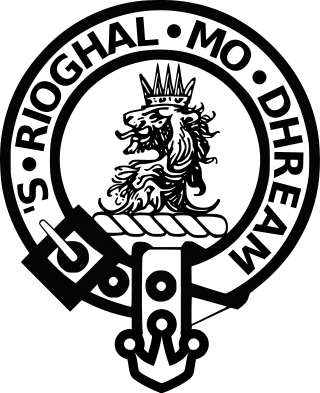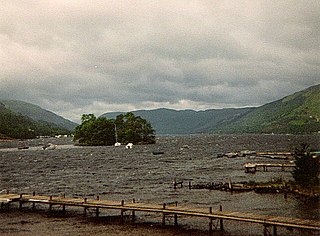Related Research Articles
McKinnon, MacKinnon or Mackinnon is a Scottish surname.,

Clan Gregor, also known as Clan MacGregor, is a Highland Scottish clan that claims an origin in the early 9th century. The clan's most famous member is Rob Roy MacGregor of the late 17th and early 18th centuries. The Clan is also known to have been among the first families of Scotland to begin playing the bagpipes in the early 17th century.
Macfie or MacFie is a surname of Scottish origin. The name is derived from the Gaelic Mac Dhuibhshíthe, which means "son of Duibhshíth". This Gaelic personal name is composed of two elements: dubh "black" + síth "peace". The earliest record of the surname is of Thomas Macdoffy, in 1296.
MacIntyre or McIntyre is a Scottish surname, relating to Clan MacIntyre. Its meaning is "Son of the Carpenter or Wright". The corresponding English name is Wright.

Clan Macnab is a Highland Scottish clan.
Geraghty and the variant Garaghty are Irish surnames, it was originally written in a Gaelic form as Mag Oireachtaigh, the name is derived from the word "oireachtach," referring to a member of an assembly. The name of the modern national legislative body in Ireland, the Oireachtas comes from the same Gaelic root.
MacDonnell, Macdonnell, or McDonnell is a surname of Scottish and Irish origin. It is an anglicized form of the Gaelic patronymic Mac Dhòmhnaill, meaning "son of Dòmhnall". The Gaelic personal name Dòmhnall is a Gaelicised form of the name Donald, which is composed of the elements domno, meaning "world", and val, meaning "might" or "rule". The name is considered a variation of MacDonald.
MacQuarrie is a family name of Scottish origin. It is an Anglicisation of the Gaelic Mac Guaire, which was a patronymic form of the Gaelic personal name meaning "proud" or "noble".

Neish Island is an island in Loch Earn, Scotland.

MacShane or McShane is an Irish surname. It derives from the Gaelic Mac Seáin or Mac Seagháin and evolved from the given name Shane, a derivative of John. Historically, the MacShanes from Ulster are a branch of the O'Neills, while in County Kerry, the surname was adopted by the Fitzmaurices.
MacColl is a surname from the Scottish Gaelic ”MacColla”, meaning "Son of Coll" shared by several notable people:

MacLaine or Maclaine is a surname of Scottish origin. It may refer to:
The surname MacTavish or McTavish is a Scottish surname, it is one Anglicised form of the Gaelic MacThàmhais, i.e. son of Thomas.
Macalister, MacAlister, MacAllister and their variants are forms of a Gaelic surname which means 'son of Alisdair'. The name originated in Scotland and belonged to a branch of the Clan Donald; they became an independent clan in 1493. From about the thirteenth century, MacAlisters were settling in the Glens of Northern Ireland, and they became numerous there.
MacSween and McSween are surnames of Gaelic origin. People with those surnames include:
MacGregor is a Scottish surname. The name is Anglicised form of the Scottish Gaelic MacGriogair. The Gaelic name was originally a patronym, and means "son of Griogar". The Gaelic personal name Griogar is a Gaelicised form of the name Gregory. The surname is used by members of the Scottish clan Clan Gregor, also known as Clan MacGregor.
McNeish is a surname. Notable people with the surname include:
McAdam, MacAdam or Macadam is a Scottish Gaelic clan which originated as a branch of Clan Gregor. As a surname it is most prominent in the Galloway and Ayrshire regions of Scotland. Some of their descendants are also to be found in Ireland, the United States, Australia and Canada.

The Battle of Glenboultachan was a Scottish clan battle fought in 1522 in Glen Boultachan, Perthshire, Scottish Highlands. It was fought between the Clan Macnab and the Clan Neish or MacNeish. The Macnabs won the battle.
References
- ↑ Way of Plean, George; Squire, Romilly (1994). Clans & Tartans. Glasgow: HarperCollins. ISBN 0-00-470547-5.